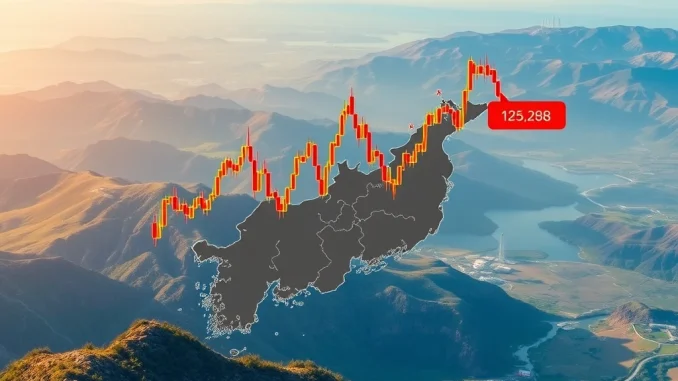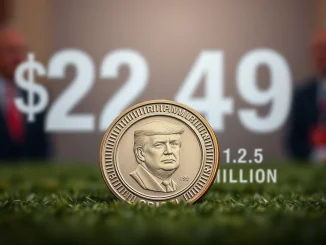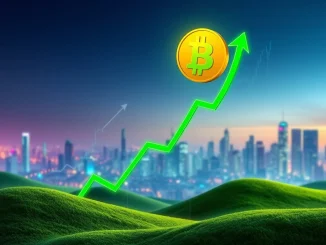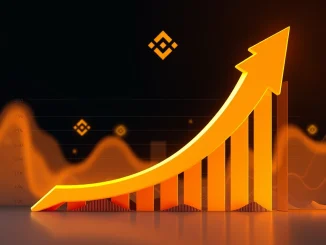
For anyone tracking global cryptocurrency markets, the term ‘Bitcoin Kimchi Premium’ often pops up. It refers to the phenomenon where the price of Bitcoin (BTC) is higher on South Korean exchanges compared to international platforms like Binance. This premium is a key indicator of unique market dynamics within South Korea.
Understanding the Bitcoin Kimchi Premium
What exactly is the Bitcoin Kimchi Premium? Simply put, it’s the percentage difference between Bitcoin’s price on South Korean crypto exchanges and its price on major global exchanges. This price gap isn’t constant; it fluctuates based on various factors, including local demand, regulatory environments, and capital controls.
Recently, this premium has seen an increase, reaching 2.0%. Let’s look at the numbers that illustrate this difference:
- Bitcoin price on Upbit (South Korea): 146,483,000 KRW
- Bitcoin price on Binance (Global): 143,608,997 KRW
- USDT price (proxy for USD) in South Korea: 1,381 KRW
Based on these figures, the absolute price difference is 2,874,003 KRW per Bitcoin. This 2.0% premium highlights a notable disparity in pricing between the South Korean market and the rest of the world.
Why Does This Price Difference Exist?
The existence and fluctuation of the Bitcoin Kimchi Premium are primarily attributed to:
- High Demand: South Korea has a very active and enthusiastic cryptocurrency trading community, often leading to higher demand than supply on local exchanges.
- Capital Controls: Strict regulations and capital controls make it difficult and expensive for investors to move large amounts of Korean Won (KRW) out of the country to buy Bitcoin on international exchanges, or to bring Bitcoin bought internationally into South Korea to sell at the premium. This limits arbitrage opportunities that would normally close the gap.
- Regulatory Environment: South Korea’s specific crypto regulations can isolate its market dynamics to some extent.
Opportunities and Challenges for Crypto Arbitrage
A significant premium like the current 2.0% naturally brings up discussions about crypto arbitrage. Arbitrage involves simultaneously buying an asset in one market where the price is lower and selling it in another market where the price is higher to profit from the difference.
For the Bitcoin Kimchi Premium, the theoretical arbitrage involves buying BTC on a global exchange (like Binance) and selling it on a South Korean exchange (like Upbit). However, executing this strategy is complex and fraught with challenges:
- KYC and Account Verification: Setting up accounts on both international and South Korean exchanges, especially for non-residents, can be a lengthy and difficult process due to strict Know Your Customer (KYC) regulations.
- Fund Transfers: Moving funds, particularly large amounts of KRW, in and out of South Korea for arbitrage purposes is restricted and subject to strict foreign exchange controls.
- Execution Risk: The premium can be volatile. By the time funds and crypto are moved between exchanges, the premium might shrink or disappear, leading to losses.
- Liquidity: Ensuring sufficient liquidity on both ends for large trades is crucial.
- Regulatory Compliance: Navigating the legal and tax implications in both jurisdictions is essential but complicated.
Therefore, while the 2.0% premium presents a theoretical opportunity, practical execution of crypto arbitrage related to the Kimchi Premium is often limited to sophisticated traders or those with specific access and infrastructure.
Market Implications for South Korea Crypto
The rise in the Bitcoin Kimchi Premium is often seen as a sign of strong retail investor interest and buying pressure within South Korea crypto markets. It indicates that local demand is outpacing the accessible supply on domestic platforms, driving prices up relative to global levels.
This can have several implications:
- It highlights the relative isolation of the South Korean crypto market due to capital controls.
- A widening premium can attract attention from regulators concerned about potential illicit flows or market manipulation, although the primary driver is typically genuine local demand meeting transfer restrictions.
- It serves as a unique data point for global market analysts assessing regional demand trends.
Monitoring the premium provides insight into the sentiment and activity levels specifically within the South Korea crypto ecosystem, which is a significant part of the global market.
Comparing Prices: Upbit vs. Binance
Let’s break down the specific price points provided to see the difference clearly between Upbit and Binance:
| Exchange | Bitcoin Price (KRW) | Bitcoin Price (Approx USD via 1381 KRW/USDT) |
|---|---|---|
| Upbit (South Korea) | 146,483,000 KRW | ~106,069 USD |
| Binance (Global) | 143,608,997 KRW | ~104,003 USD |
Note: USD conversion is approximate based on the provided USDT/KRW rate, which can also have its own premium or discount.
This table clearly shows the higher price point on Upbit compared to Binance, resulting in the 2.0% premium. The price difference of 2,874,003 KRW per BTC is substantial.
Actionable Insights for Traders
While direct arbitrage is challenging, understanding the Bitcoin Kimchi Premium offers valuable insights:
- Market Sentiment: A rising premium suggests strong bullish sentiment and demand in South Korea.
- Volatility Indicator: Rapid changes in the premium can sometimes precede or follow significant price movements in the global market, though correlation isn’t always direct.
- Regulatory Watch: Awareness of the premium keeps traders informed about potential areas of regulatory focus in a major market like South Korea.
For most international traders, the premium is more of an indicator of regional market health and dynamics than a direct trading opportunity. However, for those with the means and access, it represents a potential, albeit risky, arbitrage avenue.
Conclusion: Monitoring the Premium
The recent surge in the Bitcoin Kimchi Premium to 2.0% underscores the unique characteristics of the South Korean cryptocurrency market. Driven by robust local demand and constrained by capital controls, the price disparity between exchanges like Upbit and Binance remains a fascinating aspect of global crypto trading. While the theoretical potential for crypto arbitrage exists, the practical barriers are significant. Monitoring this premium offers valuable clues about regional demand and market structure, making it a key metric for anyone interested in the global Bitcoin landscape, especially within South Korea crypto markets.



